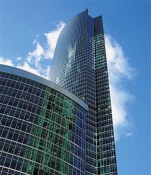ISOVER: Saves Heat and Energy

Saint-Gobain Isover products are well known on the Russian market. ISOVER heat insulating materials are widely used in industrial and civil construction as well as in housing development. The company is constantly carrying out scientific research in order to improve the quality of manufactured products and create new materials, which is especially important today when ecological and energysaving issues come to the fore. What effective solutions does the company offer Russian consumers? Vitaliy Borisov, head of certification department at Saint-Gobain Isover, is telling us about it.
What are the main characteristics of fiberglass-based mineral wool necessary for industrial and civil construction (ICC)?
Until recently density was one of the main qualitative characteristics of mineral wool used in ICC. And all construction regulations for mineral wool with high density were devised during the USSR times. Those heat insulating materials had high strength characteristics. That’s why consumer logic was dead simple – the higher the density, the better the material, and the builders have formed an unalterable opinion that only “heavy” heat insulating materials with high density, i.e. on the basis of mineral wool, can be applied in ICC. And it was impossible to attain such parameters as «compression strength», «peeling strength» on fiberglass products manufactured according to the Soviet technology. I agree that it used to be so, but the situation has cardinally changed with the emergence of new production technologies employed by Saint- Gobain Isover. Modern ISOVER heat insulating materials on the basis of fiberglass match their stone woolbased analogs and even surpass them.
Have you succeeded in creating a completely new product?
Yes, we’ve learnt to manufacture mineral wool on the basis of fiberglass with high density – 80 kg/cu. m and over, which can sustain heavy loads. For instance, insulation for composite slip systems must meet the following requirements: 15 kPa – peeling strength, 45 kPa – compression strength. To attain these figures in mineral wool on the basis of basalt, the density of the material must amount to 145 kg/cu. m., and on the basis of fiberglass – 85 kg/cu. m. It means that in the second case the density is by 45% lower, it weighs less as well, which is sure to be a positive moment, since such material is easier to work with.
Full version you can download here
 Text Elena Golubeva
Text Elena Golubeva


